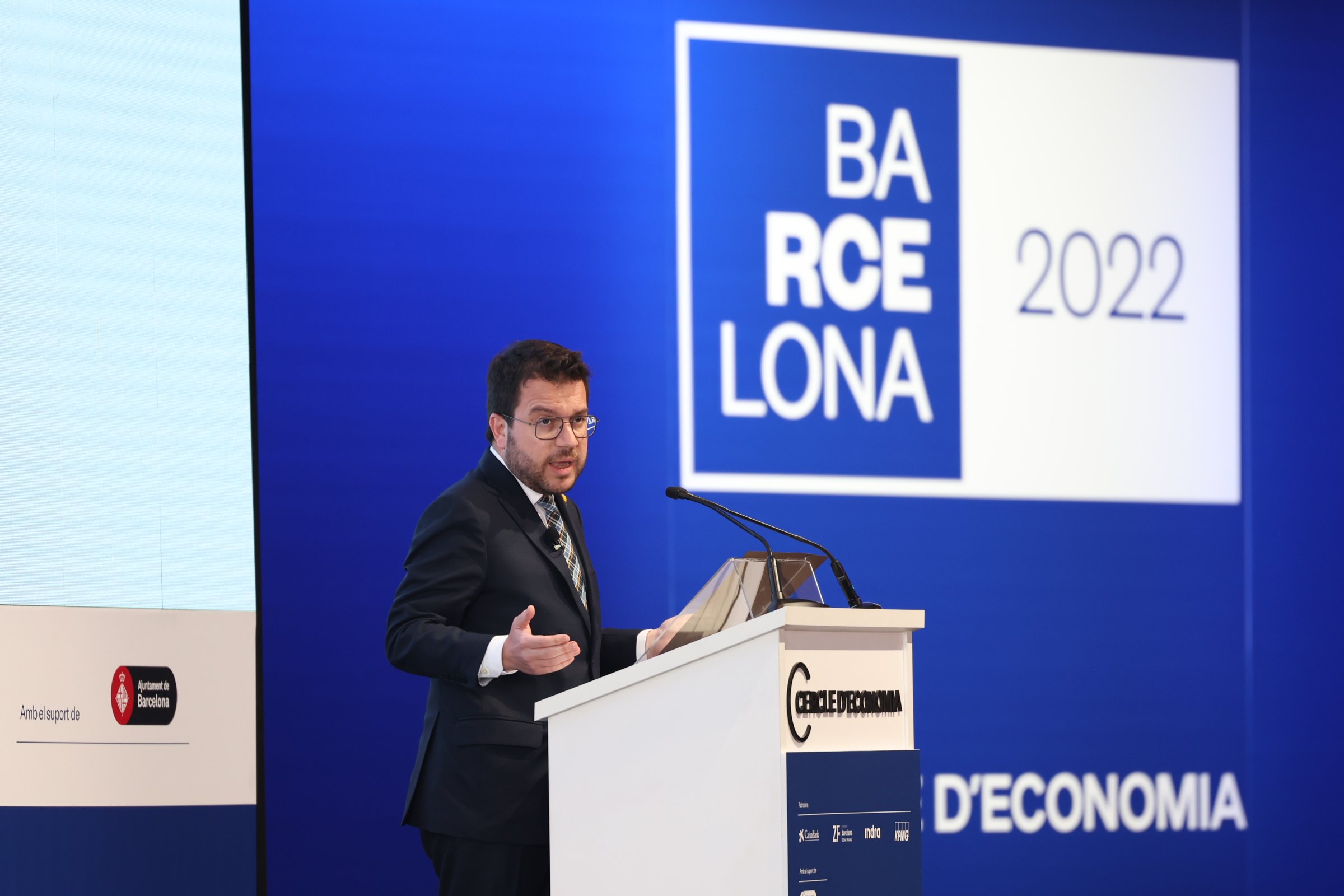The exceptional political situation since the Catalangate espionage scandal broke has been buffeting the Catalan political agenda day after day for more than two weeks. It is in this tense context that the annual business gathering of the Cercle d'Economia has begun in Barcelona this Wednesday, with a number of political and economic leaders due to take part in the discussions on the economic challenges of Catalonia and the role of Europe. The opening address was given by the Catalan president, Pere Aragonès, whose words of welcome were initially marked by a denunciation of the espionage situation, and a strong criticism of how Spanish PM Pedro Sánchez has handled an affair which the Socialists refuse to investigate.
Aragonès recalled how in last year's session of the Cercle d'Economia he expressed an "unequivocal commitment" to open a negotiation process between Catalonia and Spain to resolve the conflict, and regretted that this dialogue is now in danger: "Sánchez's handling of the espionage is destroying the path of dialogue and negotiation that we resolutely drove forward a year ago. I say these words with the pain of one who has committed himself to this path," said Aragonès.
The Catalan president once again stated that his commitment to negotiation "to build an agreement that will give the word to the people" is "rock-solid", but he expressed disappointment and concern that this commitment is not receiving an equivalent response from the Spanish government: "If the will to negotiate is real, it is essential that all doubts are resolved. If the prime minister of the state believes in dialogue, there must assumption of responsibilities and cleansing," and he warned that the scandal must be brought to a turning point where responsibilities are stated to avoid a change of direction in the commitment to dialogue that the Catalan government began a year ago.
Need to abandon defeatism
Beyond the current political situation, Aragonès made contributions to the economic debate, demanding that in the face of adversity after the pandemic and now with the crisis in Ukraine, it was essential not to fall into dispiritedness and fatalism, but rather to find encouragement "to continue to drive forward the changes the country has already begun." "The country must have more confidence in itself, believe in the full potential of the Catalan economy, in the creativity that has historically allowed us to overcome very demanding contexts."

He spoke of the need to halt the inflationary spiral resulting from the war, and for a commitment to measures to prevent a social crisis that would hit the lower-income population: "There are no magic recipes," he warned, appealing to the responsibility of everyone, while also blaming the Spanish government for having so far failed to respond on whether Catalonia would be granted a larger deficit target "to make the coming months easier for companies and sectors in the country".
Cercle insists on airport expansion
Before Aragonès's address, the president of the Cercle d'Economia business grouping, Javier Faus, opened the session and appealed to the "unity" of the country to overcome the war, and the economic, energy and social crises as a result of the Ukraine invasion. Unity was needed but also "pragmatism and a good dose of realpolitik", he said, asserting that it was a strong point that there existed great consensus on what needed to be done, but that there was a lack of courage and pragmatism by the administrations to implement the necessary policies.

In his speech, he put some of the onus on the Catalan government, emphasizing the need to make Catalonia more ambitious and innovative, and that to do so, this required good infrastructure and connections, which is why he asked Aragonès to return "to the negotiation table" over the expansion of Barcelona's El Prat airport: "We understand, value and respect the difficulties and complexities related to the expansion of El Prat, from regulatory, to environmental protection and political. We can analyze and debate them. We want to. But the country needs this infrastructure and the government cannot hide from this reality."
Three days of debate
During these three days, dozens of experts and political and economic representatives will take part in the annual meeting of the Cercle d'Economia, held at the Hotel W on the Barcelona seafront, which will also be attended by the president of the European Commission, Ursula von der Leyen; the Spanish PM, Pedro Sánchez; the Spanish minister of transport, Raquel Sánchez; the Catalan economy minister, Jaume Giró; and the mayor of Barcelona, Ada Colau. Also present will be multiple leaders from the country's leading utilities and major "Ibex-35" companies.

